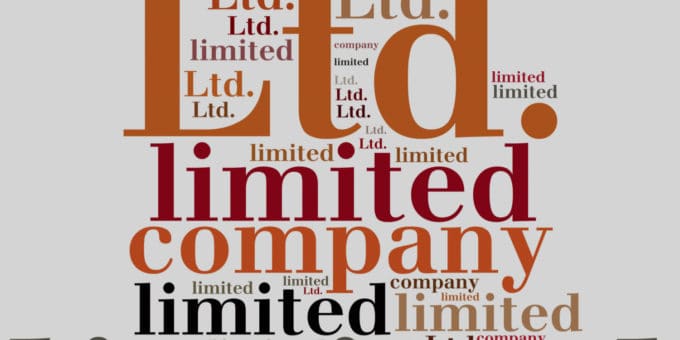A limited company is a business structure incorporated at Companies House as a legal ‘person’. It is entirely separate from its owners, can enter into contracts in its own name, and is responsible for its actions, finances, and liabilities.
The owners of a company are protected by ‘limited liability’. This means that, in most cases, they’re only responsible for business debts up to the value of their shares or personal guarantees.
A limited company must be incorporated as ‘limited by shares’ or ‘limited by guarantee’. Limited by shares companies are owned by one or more shareholders and managed by one or more directors. Limited by guarantee companies are owned by one or more guarantors and managed by one or more directors. The same person can be an owner and director, so you can register a company by yourself or with others.
Key Takeaways
- Limited liability protects personal assets, ensuring owners only risk their investment in shares or guarantees.
- A limited company structure enhances credibility, making it more appealing to potential investors and partners.
- Tax efficiency increases as limited companies allow owners to minimize personal tax through salaries and dividends.
What is a company limited by shares?
A company limited by shares is the most popular company structure. It is designed for people who want to run a profit-making business, keep surplus income for themselves, and protect their personal finances and assets with ‘limited liability’.
Overview
- A separate legal entity responsible for its income, assets, debts, and liabilities.
- The most popular type of company for small to medium-sized businesses.
- Shares are owned by shareholders. These individuals buy shares in the company by investing money in the business. Each shareholder’s percentage of ownership depends on the quantity and value of shares they own.
- Shareholders’ financial liability is limited to the number and value of their shares. If a company is unable to pay its bills, shareholders are only required to contribute the ‘nominal’ value of their shares, which is usually £1 per share.
- Profits are distributed to shareholders according to their ownership of the company. These profits are issued as dividend payments. It is also common to reinvest a percentage of profits in the business.
- Shareholders appoint directors to manage day-to-day business activities on their behalf. It is common for shareholders and directors to be the same people.
Why would I form a company limited by shares?
- You want to start a business to generate profit for personal use.
- This type of company structure will enable you to sell a percentage of the business to others.
- As a shareholder, you are not personally liable for your company’s debts—you are only responsible for what you agree to pay for your shares.
- A limited company structure creates a professional image and improves credibility. Many people and other businesses prefer to deal with limited companies rather than sole traders.
What is a company limited by guarantee?
Limited by guarantee is a type of company is most commonly used by people who want to set up a non-profit organisation or charity. The owners of this type of company usually reinvest surplus income in the business, rather than taking any profit for themselves.
Overview
- A separate legal entity responsible for its income, assets, debts, and liabilities.
- There are no shareholders because this type of company does not issue shares. Limited by guarantee companies are owned by individuals called ‘guarantors’ (aka ‘members’).
- A guarantor’s personal liability is limited to a fixed amount called a ‘guarantee’. The guaranteed sum must be paid to the company if it can’t afford to pay its bills.
- Guarantors appoint directors to manage the company’s day-to-day affairs. It is commonplace for guarantors to appoint themselves as directors.
Why would I form a company limited by guarantee?
- You plan to set up a charity or not-for-profit enterprise, e.g. sports club, association, cooperative, social enterprise, etc.
- Profits will be kept in the business to achieve and/or promote its non-profit aims. Surplus income will not be distributed amongst the guarantors.
- The personal finances of guarantors are protected by limited liability. Guarantors are only responsible for business debts up to the amount they guarantee.
- The incorporated status will improve your organisation’s professional image and credibility. Others are more likely to invest in or work with a non-profit set up as a limited company.
What does ‘limited liability’ mean?
Limited liability is the extent of financial responsibility that a shareholder or guarantor has for company debts. This means that the individual’s finances and assets are protected beyond what they invest in shares or guarantee to the company.
If a limited company is sued or unable to pay its bills, the owners are only at risk of losing the nominal value of their shares, the amount stated in their guarantees or the money they have already invested in the business. Limited liability is one of the foremost reasons for running a business as a limited company.
Liability of limited company shareholders
Companies limited by shares must issue at least one share. There is no upper limit to the number of shares a company can issue. These shares are owned by shareholders. The nominal amount paid or due to be paid for each share is the limit of each shareholder’s liability.
Example:
- A company issues 100 shares with a nominal value of £1 each
- The company has 10 shareholders, each of whom takes 10 issued shares
- The most amount of money that each shareholder will have to contribute towards company debts is £10
- The combined liability of all shareholders is £100
Liability of guarantors
Companies limited by guarantee do not have shares or shareholders. Each guarantor must agree to pay a fixed sum toward company debts if and when required. This is called a ‘guarantee’. In most companies, the nominal sum of each guarantee is £1. This is the limit of each guarantor’s liability.
How does a limited company compare with other types of business structures?
Unincorporated businesses like sole traders and traditional partnerships place unlimited liability on their owners because there is no legal distinction between the business and the individual. All business finances, debts, and liabilities are the owners’ responsibility. If a sole trader is sued or their business becomes insolvent, their personal finances and assets are at risk.
Advantages of a limited company structure
The most significant advantage for most people is limited liability. However, there are many additional benefits, including:
- Tax efficiency
- Credibility and professional company image
- Greater opportunities for raising capital
- Can be set up by one person or multiple people
- Perpetual succession (i.e. the company exists beyond the departure or death of its members)
- Protected company name
There are also a few disadvantages to be aware of, including:
- Additional filing and reporting requirements
- More complex accounting and taxation requirements
- Potentially higher administrative and accountancy costs
- Company information is disclosed on public record, including details of directors, members, and people with significant control (PSCs)
However, more often than not, limited company benefits far outweigh any perceived disadvantages.
Tax benefits of a limited company
A limited company is a tax-efficient business structure when your annual taxable income reaches around £50,000, but it can vary. This is because limited companies pay Corporation Tax on their profits. Company owners can then minimise their personal tax and National Insurance contributions (NIC) by paying themselves a director’s salary and dividends. Directors can also defer tax by leaving surplus income in the business bank account and withdrawing it in a later tax year.
Sole traders do not have the same tax benefits. They pay 20-45% Income Tax (or 19-48% in Scotland) on all taxable earnings, plus Class 4 National Insurance contributions. There is no option for sole traders to minimise their tax or National Insurance liabilities, nor can they defer tax by leaving profits in the business to withdraw later. Tax efficiency is one of the main reasons why many people set up limited companies or convert from sole trader to limited company.
Corporation Tax vs. Income Tax (2025/26 tax year)
If you run your business as a limited company, you will pay 19% Corporation Tax if your taxable profits are £50,000 or less, 25% if profits are £250,000 or more, or you can claim Marginal Relief if your profits are between these two thresholds.
If you run your business as a sole trader, you will pay 20% Income Tax on profits between your tax-free Personal Allowance of £12,570 (if applicable) up to £50,270; 40% on profits between £50,271 and £125,140; and 45% on profits above £125,140. The rates and thresholds are slightly different if you pay Scottish Income Tax.
The benefit of a limited company is that you can minimise your Income Tax and National Insurance by taking part of your remuneration as a salary and the rest as dividends. To achieve the most tax-efficient pay structure, you can pay yourself through a company in the following way:
- Take a director’s salary up to the NIC secondary threshold of £5,000/year. You won’t pay Income Tax, employee Class 1 NICs, or employer NICs on earnings up to this limit.
- Top up your salary with regular dividend payments. Dividends can only be issued when you have available profit, so you can issue them frequently or in a lump sum at the end of the tax year. The first £500 of dividend income in a year is tax-free. You will pay dividend tax above that amount, but you won’t have to pay any Income Tax or NICs on your dividends.
The company will pay 15% employer’s National Insurance through PAYE on your director’s salary above £5,000/year. However, salaries and employer NICs are tax-deductible expenses, so you won’t pay Corporation Tax on this money.
With careful planning, you could reduce your Income Tax and National Insurance liabilities by paying yourself in such a way. This is not possible as a sole trader.
Corporation Tax Calculator
Leaving surplus cash in your company
A limited company can leave some of its surplus income in its profit and loss reserves to use or withdraw later. This can be beneficial if removing all of your trading profits in one financial year would cause you to become a higher or additional rate taxpayer.
If you do not require all the funds, you can defer your personal tax by withdrawing some of your profits in a future year when it is more tax-efficient.
It is not possible to do this as a sole trader because there is no legal distinction between business and personal income. This means that Income Tax and National Insurance have to be paid on all profit in the tax year it is earned, regardless of whether the profit is left in the business or taken as personal income.
How to register a limited company
Rapid Formations offers a range of online company formation packages for companies limited by shares. We also have a tailor-made package for companies limited by guarantee. The application process is simple and affordable, with prices starting at £2.99 (plus the Companies House filing fee of £50.00). Follow these 4 simple steps to register a new company today:
- Choose a company name
- Purchase one of our company formation packages
- Complete the online application form
- Submit your application to Companies House
Within 24 hours, your new company should be registered at Companies House. You will receive your incorporation documents immediately, and you can start trading whenever you like. For detailed guidance on setting up a company limited by shares or guarantee, take a look at our steps to registering a company.
Please note that the information provided in this article is for general informational purposes only and does not constitute legal, tax, or professional advice. While our aim is that the content is accurate and up to date, it should not be relied upon as a substitute for tailored advice from qualified professionals. We strongly recommend that you seek independent legal and tax advice specific to your circumstances before acting on any information contained in this article. We accept no responsibility or liability for any loss or damage that may result from your reliance on the information provided in this article. Use of the information contained in this article is entirely at your own risk.










Join The Discussion
Comments (14)
I have a job and pay 40% tax on my salary. i also run a small business in my spare time – the business does not make much money (£3,000 to £10,000 pa), however as i am liable to pay 40% tax on all of this would it be worth my while turning my little business into a limited company so that i only pay 19% corporation tax? (If i understand it correctly!)
Thanks
Dear Jane
Unfortunately we are not accountants or tax advisors and would advise that you speak to an accountant to find the most tax efficient way for you to structure your finances.
Best Regards,
How would I go about transferring shares from one person to another (free of charge)?
Dear Brian
You can transfer shares from one person to another by following the correct procedure at Companies House. If you would like guidance on this matter please see our blog https://www.rapidformations.co.uk/blog/share-transfers-from-one-person-to-another/
Best Regards,
Hi. Basically I am a lorry driver, trading as a limited company. I offer my driving services to one agency where I have worked for several years. From january this year until now my earnings have amounted to 39700. On all this I was required to pay vat (5000 to date) corporation tax (3500) and now I have learnt from my accountancy firm that I still have to pay a self-assesment tax (which will most likely also be in several thousands). I am basically asking if I dont pay too much (its basically the same as I was paying when I wasnt trading as ltd company but a paye emplyee) and if all this tax applies to me and my circumstances. Ghanks for your reply.
Dear Sir
Thank you for your message. The question you have is a question for an accountant. We are not accountants so are not able to advise you in this case.
Best regards,
Rapid Formations Team
Hi,
Is it possible to change from a non profit organisation to a Limited company?
Hi Tom,
Yes, this is often possible. What is the current structure of the non-profit organisation you wish to convert?
Rachel
Is the Partership Act of 1907 appropriate to private company limited by shares? Is there any legal difference between limited partnership and private company limited by shares?
Hi Jan,
The 1907 Partnership Act is only applicable to limited partnerships, not private limited companies or limited liability partnerships (LLPs). Limited companies are incorporated under the Companies Act 2006; LLPs are incorporated under the LLP Act 2000. Whilst these business structures are all completely different, they all have to be registered at Companies House.
Take a look at these guides to read more about them:
Limited partnership – https://www.gov.uk/set-up-and-run-limited-partnership/overview
Limited companies vs LLPs – https://www.rapidformations.co.uk/blog/limited-company-or-llp/
If you need more help or advice, please do get back in touch with me.
All the best.
Rachel
if i register at companies house say as topshop group, under that umbrella i may have lots of small businesses, can i then trade as eg ‘topshop 1’ ?
regards
Dear Katie
Thank you for your message.
You can have as many different types of trade running within one company and you can trade these arms of your business under different trading names although you are required on your literature and websites etc to show the name of the Limited Company and the Registered Office behind the trading name.
Kind Regards
Hi,
Can i change a private company to a company limited by guarantee ie non-profit company
thanks for your help
Dear Abdul
Thank you for your message.
You are not able to change the type of company you have created. You would need to set up a new Limited by Guarantee company for non-profit objectives.
Kind Regards